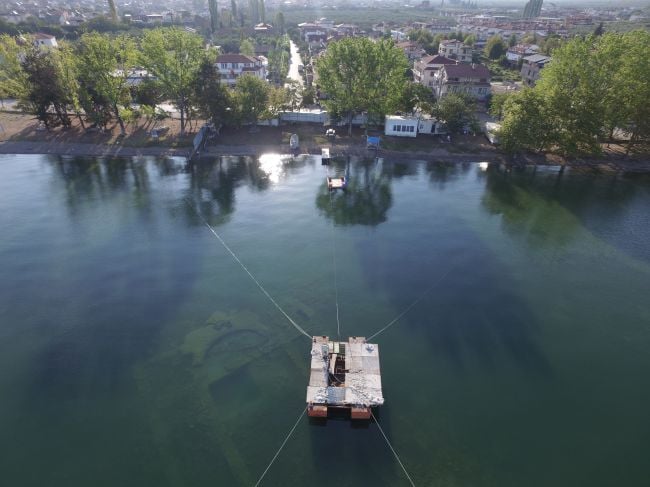
The remains of a 4th century AD basilica discovered in Lake İznik, in the Turkish province of Bursa, are being turned into an underwater museum, Hürriyet Daily News reports.
According to Professor Mustafa Şahin, head of the archaeology Department of Uludağ University, the basilica was discovered in early 2014, when a team of researchers photographed the city from the air in order to make an inventory of historical and cultural artifacts.
While the project is still under wraps, HDN reports that preliminary works have already begun.
A team comprising workers from the companies Orcan Vessel Rescue and Maritime Construction, working alongside Geomarine Land and Marine Research, is conducting a surface survey.
The floor plan of the 1,600-year-old Christian church covered Turkey’s Lake Iznik. Image courtesy of Mustafa Şahin/Lake Iznik Excavation Archive.
“The project design will be the next stage,” Tuğrul Orcan, a member of the team, told HDN. “We are also working to find out if there are other archaeological remains in the area of the basilica. The seismic values and bathymetry of the area will be measured and building survey will be made,” he said.
The underwater museum has been approved by the Culture and Tourism Ministry, and will be carried out by the Bursa Metropolitan Municipality, which is sponsoring the project.
Archaeologists have rediscovered a 1,600-year-old Christian church covered by Turkey’s Lake Iznik. Photo courtesy of Mustafa Şahin/Lake Iznik Excavation Archive.
Experts believe that the building collapsed as a result of an earthquake that took place in the year 740. They were able to establish that the basilica was erected in honor of St. Neophytos, one of the Christian saints tortured during the reign of Roman emperors Diocletian and Galerius.
The discovery of the basilica was named as one of top 10 discoveries of 2014 by the Archaeological Institute of America. But it is not the only wonder to have been found in Turkey in the last few months.
In the summer of 2014, a large network of underground tunnels were discovered during routine renovation work underneath a single storey home in Anatolia, pointing to the existence of an ancient underground city.